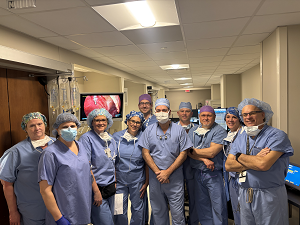Deaf Cancer Patient Support Group
This quarterly in-person group is especially for patients who are deaf or hearing impaired, as well as their caregivers. Support and education are...
Appendix cancer, also known as appendiceal cancer, affects fewer than 1,000 people in the United States each year. While rare, several effective treatment options are available. Our expert team of cancer specialists will create a personalized treatment plan tailored to your needs.
Our Henry Ford Cancer team includes cancer specialists from medical oncology, radiation oncology, and surgical oncology, who meet regularly to review your case. We will be with you every step of the way – from diagnosis and treatment, through recovery.
Our patients have access to the top fellowship-trained surgeons and the most advanced science-based technologies and treatments for the various types of tumors that can start in the appendix:
Surgery is the most common treatment for appendix cancer. Our team uses the most advanced techniques whenever possible, to offer you the best outcome.
Depending on the disease type, your treatment plan may also include the administration of chemotherapy and/or radiation therapy, either before or after surgery.
Your multidisciplinary team at Henry Ford Cancer will provide you with the answers, support, and resources at every step of your cancer treatment and recovery and includes:
This quarterly in-person group is especially for patients who are deaf or hearing impaired, as well as their caregivers. Support and education are...
This hybrid support group is for patients with Neurofibromatosis types 1 and 2 and their care partners. Medical experts will present topics and...
This twice monthly group, facilitated by a professional counselor/social worker, offers patients an opportunity to express their feelings and...
Heal through art in the comfort of your home, but with the support of a group and registered art therapist during this monthly virtual art therapy...

DETROIT — Newly published research conducted in Wayne County, Mich. found that non-smokers, particularly women, who lived near textile and...




Millennials are now at a higher risk for developing colorectal cancer than baby boomers. Here are some potential reasons why - and what you can do to lower your risk.

For women undergoing breast cancer treatment, yoga and other low-impact exercises have proven benefits for reducing stress and aiding recovery.

Learn how to detect pancreatic cancer, who is at risk and what treatment advances have been made in recent years.

It's important to diagnose ovarian cancer as early as possible. Here's how to be proactive about your risk for this disease.
We use cookies to improve your website experience. By using this site, you agree to our Terms of Use. Read our Internet Privacy Statement to learn what information we collect and how we use it.